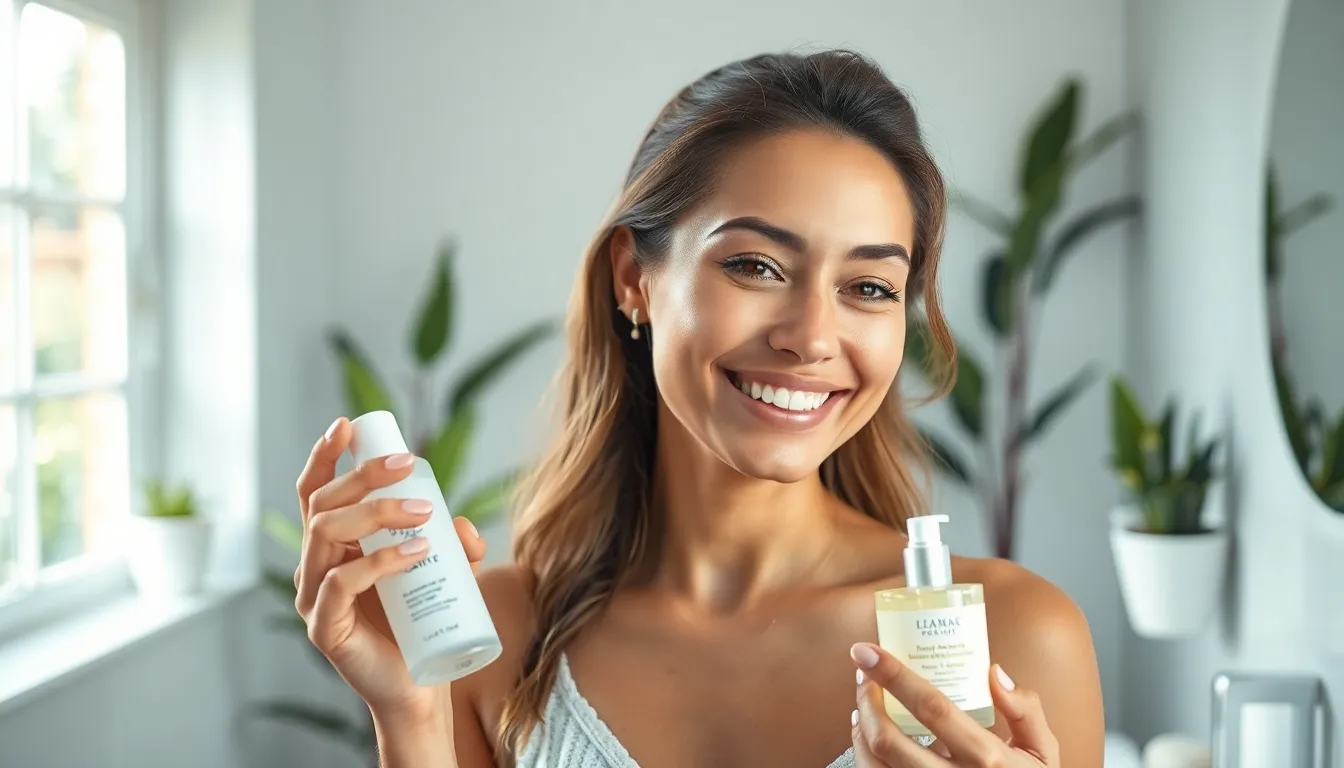Table of Contents
ToggleAchieving hydrated skin is a goal for many, yet it often feels elusive. With countless products and advice available, knowing where to start can be overwhelming. A consistent routine tailored to individual skin types can make all the difference in maintaining that coveted glow.
Hydrated skin not only looks healthier but also functions better, protecting against environmental stressors and aging. By understanding the essential steps in a skincare regimen, anyone can unlock the secret to plump, radiant skin. From cleansing to moisturizing, each element plays a crucial role in hydration. Dive into a routine that promises to rejuvenate and nourish, ensuring skin stays soft and supple all day long.
Importance of Hydrated Skin
Hydrated skin plays a crucial role in overall skin health. Hydrated skin enhances skin elasticity, leading to a smoother and more youthful appearance. It also acts as a barrier against environmental stressors like pollution, UV rays, and harsh weather, reducing the risk of irritation and damage.
Hydrated skin promotes effective cell turnover. When skin remains adequately moisturized, it facilitates the shedding of dead skin cells, allowing for the emergence of fresh, healthy cells. This process improves skin texture and tone.
Hydrated skin supports the skin’s natural functions. Well-hydrated skin retains essential nutrients, helping to maintain proper pH levels and balance oil production. This balance can prevent issues such as excessive dryness, oiliness, or acne.
Hydrated skin minimizes the appearance of fine lines and wrinkles. Keeping the skin well-moisturized ensures a plump look, reducing the visibility of aging signs. This helps individuals achieve a more radiant complexion.
Hydrated skin contributes to overall well-being. When skin feels comfortable and looks vibrant, it can positively affect self-esteem and confidence levels. Prioritizing hydration is essential for maintaining skin’s vitality.
Daily Routine for Hydrated Skin

A daily skincare routine enhances skin hydration and health, ensuring a radiant complexion. Following consistent morning and evening steps targets hydration effectively.
Morning Routine
- Cleansing: Begin with a gentle, hydrating cleanser. This removes overnight impurities without stripping natural oils.
- Toning: Apply an alcohol-free toner. Toners with hydrating ingredients like rosewater or aloe vera enhance moisture levels.
- Serum: Use a hydrating serum containing hyaluronic acid or glycerin. These ingredients attract water to the skin, boosting hydration.
- Moisturizing: Select a lightweight moisturizer suitable for your skin type. Moisturizers lock in hydration while providing essential nutrients.
- Sunscreen: Apply broad-spectrum SPF 30 or higher. Protecting skin from UV rays is vital for maintaining moisture and preventing damage.
Evening Routine
- Cleansing: Cleanse with a nourishing cleanser. This helps remove makeup and dirt accumulated throughout the day.
- Exfoliating: Use a gentle exfoliator 2-3 times a week. Exfoliation promotes cell turnover and enhances product absorption, leaving skin smoother and more receptive to hydration.
- Toning: Reapply a hydrating toner. This replenishes moisture after cleansing and prepares skin for follow-up products.
- Serum: Apply a nourishing serum rich in antioxidants. Ingredients like vitamin C or peptides combat free radicals while supporting hydration.
- Moisturizing: Choose a richer moisturizer for nighttime use. Night creams or oils help seal in moisture and repair skin while sleeping.
Key Ingredients for Hydration
Hydrated skin relies on specific ingredients that lock in moisture and create a healthy barrier. Understanding these essential components enhances overall skin health.
Humectants
Humectants draw moisture from the environment into the skin. Common humectants include glycerin, hyaluronic acid, and aloe vera. Glycerin attracts about 1,000 times its weight in water, making it an excellent choice for hydration. Hyaluronic acid holds water, helping skin appear plump and dewy. Aloe vera soothes while adding hydration, making it suitable for sensitive skin. Products containing these humectants enhance moisture retention and improve skin texture.
Emollients
Emollients smooth and soften the skin by filling in gaps between skin cells. Ingredients like shea butter, jojoba oil, and squalane are effective emollients. Shea butter is rich in fatty acids, providing deep nourishment and improving elasticity. Jojoba oil mimics skin’s natural oils, ensuring compatibility and hydration. Squalane, derived from olives or sugarcane, balances oil levels while delivering moisture. Incorporating emollients helps maintain a soft, supple feel and ensures skin looks and feels smooth.
Occlusives
Occlusives form a protective barrier on the skin, preventing moisture loss. Lanolin, petrolatum, and beeswax are popular occlusive agents. Lanolin creates a waterproof barrier, sealing in hydration and aiding in skin barrier repair. Petrolatum has a highly effective occlusive property that retains moisture for extended periods. Beeswax offers protective benefits while allowing the skin to breathe. Using occlusives, especially in dry climates, can significantly enhance skin hydration levels, promoting a healthy appearance.
Tips for Maintaining Hydrated Skin
- Drink Water Regularly
Drinking at least 8 glasses of water daily supports skin hydration from within. Staying hydrated enhances overall skin appearance.
- Choose the Right Moisturizer
Selecting a moisturizer formulated for specific skin types maximizes hydration. Look for products containing hyaluronic acid, glycerin, or ceramides.
- Use a Humidifier
Utilizing a humidifier during dry seasons or in air-conditioned environments increases ambient moisture. This strategy prevents skin from drying out and promotes hydration.
- Limit Hot Showers
Limiting hot showers helps preserve skin’s natural oils. Opt for lukewarm water to avoid stripping moisture from the skin.
- Exfoliate Gently
Exfoliating 1-2 times weekly removes dead skin cells without causing irritation. Gentle exfoliation encourages better absorption of hydrating products.
- Apply Products on Damp Skin
Applying serums and moisturizers on damp skin enhances hydration retention. This method seals in moisture effectively.
- Incorporate Antioxidants
Using serums or creams containing antioxidants boosts skin protection. Ingredients like vitamin C and E fight free radicals, enhancing skin hydration.
- Avoid Alcohol-Based Products
Steering clear of alcohol-based toners prevents over-drying. Instead, opt for hydrating toners infused with soothing ingredients.
- Wear Sunscreen Daily
Wearing broad-spectrum sunscreen every day protects against UV damage. Shielding the skin maintains hydration and prevents water loss.
- Consider Diet
Incorporating omega-3 fatty acids, found in fish and nuts, supports skin health. A balanced diet rich in fruits and vegetables further enhances hydration levels.
Achieving and maintaining hydrated skin is a journey that pays off with a radiant complexion and improved skin health. By following a tailored skincare routine and incorporating key hydrating ingredients, anyone can unlock the benefits of well-moisturized skin.
Consistency is crucial in this process. Daily practices like cleansing, moisturizing, and protecting against environmental stressors create a solid foundation for skin vitality.
Additionally, lifestyle choices such as staying hydrated and eating a balanced diet significantly enhance the skin’s hydration levels. With dedication to these routines and habits, anyone can enjoy the confidence that comes with healthy, glowing skin.




